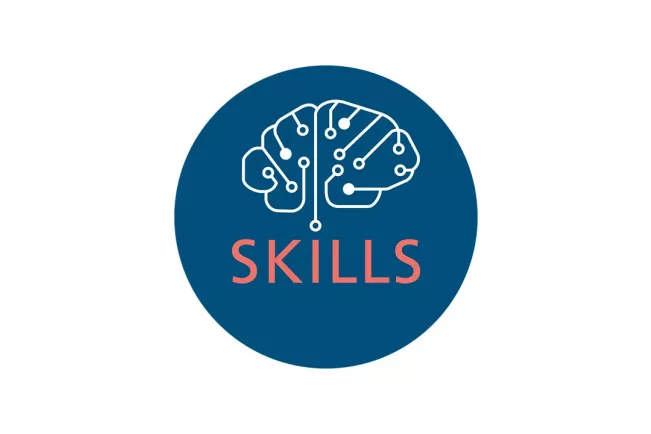SKILLS - Increasing competence orientation in digital teaching and learning

Research project at a glance

Departments and Instituts
Funding type
Period
01.08.2021 to 31.07.2024
Project Description

Projektidee und Projektziele
The SKILLS project supports students and teachers in the use of digital opportunities.
The goal of the SKILLS project is to promote learning success and motivation to study through the development of competencies and the use of digital exams. The focus is on improving university teaching in two areas:
- SKILLS promotes the acquisition of future skills for study and work. Future skills are digital competence, self-management competence and recreational competence. SKILLS relies on peer training as a form of teaching and learning: first-year students from all disciplines can take part in training courses on future skills. Especially for them, future skills are important from the very beginning in order to successfully master their studies and professional challenges. The peer trainings are conducted by master students. They are trained as peer trainers and learn to coach fellow students from younger semesters in future skills. The training concept "by students for students" thus benefits both bachelor and master students. (Subproject 1 "Peer Training")
- SKILLS supports the expansion of digital testing options. In the future, these are to be used increasingly for effective feedback on the learning status. At the same time, the potential and opportunities offered by digital examinations are to be explored and the redesign of formats is to be closely monitored, not least in order to contribute to an increase in the quality of examinations in general. ( Subproject 2 "E-Assessment")
Structure and process of the project
The development and implementation of the peer trainings are the responsibility of the heads of the subproject Prof. Dr. Christine Syrek and Prof. Dr. Patrizia Ianiro-Dahm. The positions in the area of examination didactics are located in the e-learning team headed by Susanne Kundmüller-Bianchini. Networking with the faculties and their teaching staff takes place via the advisory, training and support services of ZIEL, the e-learning team and the Vice President for Studies, Teaching and Continuing Education, Prof. Dr. Marco Winzker. In this way, experts and multipliers can be identified in the various departments.
Empirical Studies in Subproject 1 "Peer Training"
Subproject 1 "Peer Training" also deliberately integrates a scientifically based evaluation as well as empirical studies. It thus contributes to the expansion of the state of research in the field of competence-based peer training. The object of the research project is the change in action-related competencies in the course of participation in peer training on future-relevant key competencies (study 1). In addition, statements will be made regarding the significance of non-verbal behavior of peer trainers in relation to training success (study 2).
Peer training approaches are characterized by the concept "by students for students": Thus, these approaches create a safe learning environment, for example, due to the constant exchange and the common language of the students (cf. Stigmar, 2016). Because of these characteristics, peer training approaches promote learning success, create a deeper understanding of the content being taught, and increase students' problem-solving skills (Rees, Quinn, Davies & Fotheringham, 2016; Secomb, 2008; Stigmar, 2016). In addition, peer training approaches achieve positive effects in terms of student satisfaction, motivation, and reduction of dropout tendencies (see Stigmar, 2016). An open area of research so far is the question to what extent peer training approaches achieve sustainable competence enhancement (Roberts et al., 2019; Stigmar, 2016). The SKILLS peer training approach addresses this question and examines the teaching of extracurricular competencies through peer training. In doing so, comparisons of different faculties of the Bonn-Rhein-Sieg University of Applied Sciences will also be possible.
For this purpose, a continuous, empirically based and structured evaluation in pre- and post-survey design will take place in the first research project. The core of this survey is to show changes as a result of participation in the peer training. Furthermore, the effects of the peer training on study-related variables such as identification with the study program, dropout tendencies and study satisfaction are to be surveyed. By recording these variables, the effectiveness of the peer training will be evaluated. The aim is to make statements about the influence of the training participation on study- and health-related variables. This is a voluntary and anonymous survey of an experimental as well as a control group. Students in both the experimental and control groups will receive individualized feedback in Unipark upon completion of the survey. Through this feedback, students learn about themselves and how their competencies have changed.
Q1: Do peer training sessions on (a) digital competence, (b) self-management competence and (c) recovery competence increase these?
Q2: How do the competencies (a) digital competence, (b) self-management competence, and (c) recovery competence develop over time?
Q3a: Does participation in peer training affect study- and health-related variables?
Q3b: To what extent is this relationship mediated by (a) digital literacy, (b) self-management skills, and (c) recovery skills?
The second study of this subproject aims at analyzing the nonverbal behavior of trainers in online and face-to-face settings. The behaviors and characteristics of the trainers are relevant factors influencing the training results and the learning outcomes of the participants (Glerum, Joseph, McKenny & Fritzsche, 2021; Sitzmann, Brown, Casper, Ely & Zimmerman, 2008). For example, with regard to online as well as face-to-face training, Glerum et al. (2021) found that the traits and behaviors of the trainer are essential to training success. Rangel et al. (2015) also found that the nonverbal behavior of the trainer was a factor influencing transfer success.
The second research project of this subproject aims at analyzing the nonverbal behavior of trainers in online and face-to-face settings. The core of this analysis is the question of whether friendly affect on the part of peer trainers leads to greater training success and improved relationship building with participants. Thus, friendly affect already proved to be a relevant influencing factor in coaching research (Ianiro, Schermuly & Kauffeld, 2013; Ianiro, Lehmann-Willenbrock & Kauffeld, 2015). Ianiro-Dahm, de Haan, and Duda (in prep) also showed that neutral affect had a negative impact on the quality of online coaching. To date, no findings exist that transfer the influence of friendly affect to the training context (cf. Glerum et al., 2021). Addressing this research gap, the peer trainings conducted are videotaped. The friendliness of the trainers and its significance for the effectiveness and relationship building of trainings in face-to-face and online settings will be examined.
Q1: Does friendly affect of peer trainers lead to higher training success of participants?
How do the effects of friendly affect in online and face-to-face settings differ on the training success of the participants?
Q2: Does friendly affect of peer trainers lead to better relationship building with participants?
How do the effects of friendly affect on building relationships with participants differ in online and face-to-face settings?
This study is linked to the PhD project of Katrin Duda.
The empirical studies within the scope of the peer training sub-project are safeguarded by an ethics application to the Ethics Committee (EK) of the German Society for Psychology (DGPs). The requirements of the data protection officer of the H-BRS are complied with. If you have any questions about the empirical studies in the peer training subproject, please feel free to contact the subproject team.
Literature
Glerum, D. R., Joseph, D. L., McKenny, A. F. & Fritzsche, B. A. (2021). The trainer matters: Cross-classified models of trainee reactions. Journal of Applied Psychology, 106(2), 281–299. https://doi.org/10.1037/apl0000503
Ianiro, P. M., Lehmann-Willenbrock, N. & Kauffeld, S. (2015). Coaches and Clients in Action: A Sequential Analysis of Interpersonal Coach and Client Behavior. Journal of Business and Psychology, 30(3), 435–456. https://doi.org/10.1007/s10869-014-9374-5
Ianiro, P. M., Schermuly, C. C. & Kauffeld, S. (2013). Why interpersonal dominance and affiliation matter: An interaction analysis of the coach-client relationship. Coaching: An International Journal of Theory, Research and Practice, 6(1), 25–46. https://doi.org/10.1080/17521882.2012.740489
Ianiro-Dahm, P. M., de Haan, E. & Duda, K. N. (in prep). What makes for a realistic high-quality coaching conversation?
Rangel, B., Chung, W., Harris, T. B., Carpenter, N. C., Chiaburu, D. S. & Moore, J. L. (2015). Rules of engagement: The joint influence of trainer expressiveness and trainee experiential learning style on engagement and training transfer. International Journal of Training and Development, 19(1), 18–31. https://doi.org/10.1111/ijtd.12045
Rees, E. L., Quinn, P. J., Davies, B. & Fotheringham, V. (2016). How does peer teaching compare to faculty teaching? A systematic review and meta-analysis. Medical Teacher, 38(8), 829–837. https://doi.org/10.3109/0142159X.2015.1112888
Roberts, G. J., Mize, M., Reutebuch, C. K., Falcomata, T., Capin, P. & Steelman, B. L. (2019). Effects of a Self-Management with Peer Training Intervention on Academic Engagement for High School Students with Autism Spectrum Disorder. Journal of Behavioral Education, 28(4), 456–478. https://doi.org/10.1007/s10864-018-09317-2
Secomb, J. (2008). A systematic review of peer teaching and learning in clinical education. Journal of Clinical Nursing, 17(6), 703–716. https://doi.org/10.1111/j.1365-2702.2007.01954.x
Sitzmann, T., Brown, K. G., Casper, W. J., Ely, K. & Zimmerman, R. D. (2008). A review and meta-analysis of the nomological network of trainee reactions. Journal of Applied Psychology, 93(2), 280–295. https://doi.org/10.1037/0021-9010.93.2.280
Stigmar, M. (2016). Peer-to-peer teaching in higher education: A critical literature review. Mentoring & Tutoring: Partnership in Learning, 24(2), 124–136. https://doi.org/10.1080/13611267.2016.1178963







